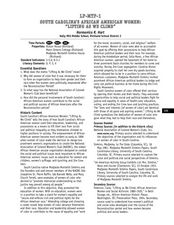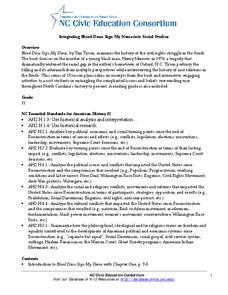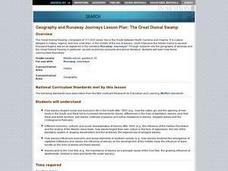Curated OER
Gullah Contributions to South Carolina History
Students research the Gullah people and their impact on South Carolina. In this South Carolina history lesson, students study, locate, and color the region of Africa the Gullah people came from. Students listen to Gullah music and watch...
Curated OER
The Role of African Slaves on South Carolina Rice Plantations
Fourth graders investigate the role of African American slaves in rice plantations. In this slave life lesson, 4th graders discuss the products produced in the 13 colonies. Students discuss the importance of rice to South Carolina's...
Curated OER
Kate Fowler: Tory Spy
Fourth graders study the American Revolution and several key aspects and people involved in it. In this American Revolution lesson plan, 4th graders study the land grant for British colonists. Students read the 'The Legend of Kate...
Curated OER
South Carolina's Constitution
Eighth graders explore the definition of political culture. After viewing a movie, 8th graders discuss how the political culture of the 1600 and 1700s is reflected in early drafts of the South Carolina constitution.
Curated OER
"An Eye For An Eye, A Tooth For A Tooth"
Sixth graders debate their reactions to two different historical documents about managing a society. In this U.S. history lesson, 6th graders read two articles on codes and laws from different time periods and debate their thoughts.
Curated OER
South Carolina's African American Women: "Lifting As We Climb"
Students explore the formation of the National Association of colored Women's Club. In this civil rights lesson, students research the history and mission of the NACWC.
Curated OER
Reconstruction and the 1868 South Carolina Constitution
Students, through lecture and group discussion, explore the American Civil War Reconstruction and how it affected the development of the 1868 Constitution of South Carolina. They discuss its impact on South Carolina even today.
US House of Representatives
“The Fifteenth Amendment in Flesh and Blood,” The Symbolic Generation of Black Americans in Congress, 1870–1887
The reading of a contextual essay launches a study of Black Americans who served in Congress from 1870 through 1887. Young historians identify the African Americans who served during this period, investigate the ways they won national...
Curated OER
From Riches to Rice
Tenth graders identify and locate Africa, the United States, the Original 13 colonies, and the region of West Africa on a map. They list examples of culture and African American culture. Students link the culture of West Africa with the...
Facing History and Ourselves
Interracial Democracy
Radical Reconstruction, the 10-year period referred to after Congress passed the Reconstruction Act of 1867, saw the establishment of manhood suffrage, men voting without any racial qualifications. Southern states also rewrote their...
Facing History and Ourselves
Defining Freedom
The Emancipation Proclamation freed slaves in the Confederate states. The Thirteenth Amendment banned slavery in the United States. However, neither document defined freedom. The second instructional activity in the Reconstruction Era...
University of North Carolina
Integrating Blood Done Sign My Name into Social Studies
Tim Tyson's Blood Done Sign My Name is the anchor text in a unit study of the history of race relations and the civil rights struggle in the South. The 11 lessons are richly detailed, and the unit deserves a space in your curriculum...
Digital History
The Crisis of 1833: Tariffs and Nullification
This resource offers a detailed review of the events that led South Carolina to nullify the Tariffs of 1828 and 1832, as well as to pass the Nullification Ordinance, which questioned the federal government's authority to enforce any law...
PBS
Breaking the Code: Actions and Songs of Protest
Ezell Blair, Jr., David Richmond, Franklin McCain and Joseph McNeil changed history. Their sit-in at the lunch counter of the Woolworths in Greensboro, North Carolina on February 1, 1960 became a model for the nonviolent protests that...
Core Knowledge Foundation
Colonial America Tell It Again!™ Read-Aloud Anthology
A read-aloud anthology explores Colonial America. Third graders listen to informational texts, discuss what they heard, and participate in extension activities and writing. Take-home materials, assessments, and remediation opportunities...
Curated OER
Social Effects of WWII
Fifth graders study the social effects of World War II on America. For this WWII effects lesson, 5th graders read paragraphs about the history of World War II. Students watch a video about the period and formulate questions for Veterans...
North Carolina Consortium for Middle East Studies
Missing Pieces of the Puzzle: African Americans in Revolutionary Times
What's missing from most studies of the American Revolutionary War is information about the role African Americans played in the conflict. To correct this oversight, middle schoolers research groups like the Black Loyalists and Black...
Crafting Freedom
George Moses Horton: Slavery from a Poet's Perspective
After reading about the life of George Moses Horton, the first slave to publish anti-slavery poetry, learners will recall his major accomplishments, provide a summary of the obstacles he faced, and identify common aspects of the...
Curated OER
John Gary Evans and the Politics of Race
Young scholars read letters written by Evans and Gunton regarding race relations. In this Progressive Movement lesson, students interpret the intentions and tone of the letters to understand contemporary racial beliefs. Young scholars...
Curated OER
Robert Smalls: Warrior and Peacemaker
Students research the events that led to the Civil War and the Reconstruction. In this Civil War history lesson, students study images of Robert Smalls and research his role in the Civil War. Students review the South Carolina...
Curated OER
End of the Line: What Happened to the Blue Ridge Railroad?
Sixth graders study the westward expansion and the role of railroad construction to the expansion. In this railroad history lesson, 6th graders complete KWL activity for the topic. Students view a PowerPoint about the growth of railroads...
Curated OER
THE GREAT DISMAL SWAMP
Students analyze how slavery shaped social and economic life in the South after 1800, the different economic, cultural, and social characteristics of slavery after 1800, and slavery both prior and after the Civil War.
North Carolina Consortium for Middle East Studies
Voices from the Trans‐Atlantic Slave Trade
Young historians trace the roots of African slavery and learn about the causes and effects of the Trans-Atlantic slave trade through a PowerPoint presentation and by reading and discussing excerpts from the book Copper Sun.
Curated OER
Brown v. Board of Education of Topeka
Twelfth graders explore desegregation as it occurred at various stages in United States history. They specifically chronicle the role of South Carolina in the desegregation case of Brown v. Board of Education.

























